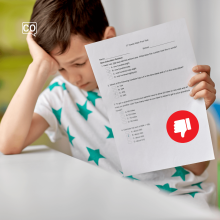Suspender (to fail) - Futuro perfecto, indicativo (Future Perfect, indicative) - Spanish

Suspender - Conjugation of to fail in Spanish: Conjugation table, examples and exercises in the future perfect, indicative tense (Futuro perfecto, indicativo).
Futuro perfecto, indicativo (Future Perfect, indicative)
All conjugations and tenses: Suspender (to fail) - conjugation and tenses - (Spanish)
Syllabus: Spanish lesson - Educación y graduación (Education and graduation)
Conjugation of to fail in Futuro perfecto
- yo habré suspendido I will have failed
- tú habrás suspendido You will have failed
- él/ella habrá suspendido he will have failed
- nosotros/nosotras habremos suspendido We will have failed
- vosotros/vosotras habréis suspendido you will have failed
- ellos/ellas habrán suspendido They will have failed.
Example phrases
- Para el próximo examen, habré suspendido mis otras tareas para concentrarme. I will have failed my other tasks to concentrate for the next exam.
- Si sigues así, tal vez habrás suspendido tus dudas pronto. If you continue like this, maybe you will have failed your doubts soon.
- Supongo que al final del día, habrá suspendido todos sus pensamientos negativos. I suppose that at the end of the day, he will have failed all his negative thoughts.
- Para mañana, habremos suspendido la idea de que no es posible realizar el proyecto. We will have failed the idea that it is not possible to carry out the project by tomorrow.
- Probablemente, para el viernes, habréis suspendido todas las reuniones innecesarias. You will probably have failed all unnecessary meetings by Friday.
- Para la próxima semana, quizás habrán suspendido sus sospechas y confiarán más. By next week, perhaps they will have failed in their suspicions and will trust more.
Exercise: Conjugate the verbs - suspender (to fail)
Instruction: Choose the correct word, read the sentence out loud and translate.
Show answers Show translationSuspender (Futuro perfecto, indicativo)
1. Para la próxima semana, quizás ... sus sospechas y confiarán más.
2. Si sigues así, tal vez ... tus dudas pronto.
3. Para mañana, ... la idea de que no es posible realizar el proyecto.
4. Supongo que al final del día, ... todos sus pensamientos negativos.
5. Probablemente, para el viernes, ... todas las reuniones innecesarias.
6. Para el próximo examen, ... mis otras tareas para concentrarme.